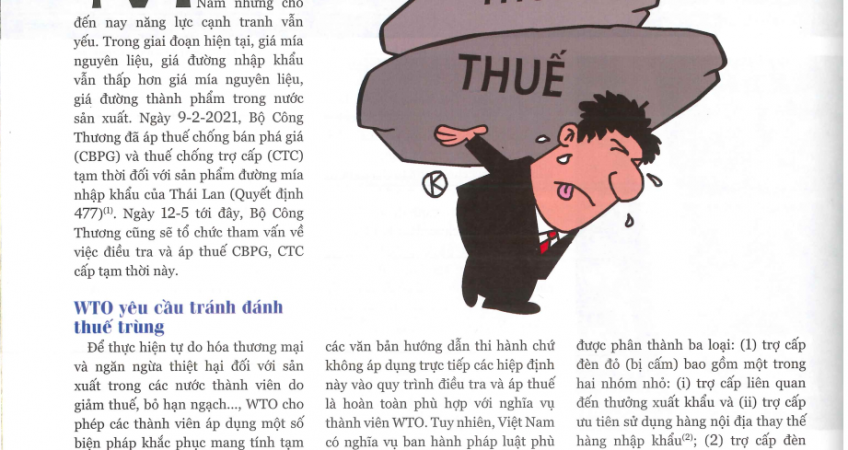
SIMULTANEOUSLY IMPOSE ANTI-DUMPING AND COUNTERVAILING DUTIES ON THAILAND SUGAR CANE: RISK OF DOUBLE REMEDIES?
Dr. Le Thi Anh Nguyet*
On February 9, 2021, to prevent damages for Vietnam’s sugar products, Ministry of Industry and Trade of Vietnam has imposed the temporary anti-dumping and countervailing duties on Thailand imported sugar cane products (“Decision 477”). 1On May 12, 2021, Ministry of Industry and Trade will also hold a consultation on the investigation and application of these two temporary duties. Meanwhile, Article VI.5 of the General Agreement on Tariffs and Trade 1994 (“GATT 1994”) requires members of the World Trade Organization (“WTO”) to not impose anti-dumping and countervailing duties on a imported goods (“principles of avoiding double remedies “). The article analyzes the principle of avoiding double counting and, accordingly, to recommend some solutions thereto.
WTO requires to avoid double remedies
For the purpose of trade liberalization, WTO requires its members to cut down tariffs and eliminated tariff quotas. Therefore, to prevent damages for the domestic industries relating thereto, WTO allows its members to apply a number of the temporary remedies including: (i) anti-dumping measures (when foreign enterprises are concluded to dump); (ii) anti-subsidies (when foreign governments provide subsidies, financial incentives towards the export performance) and (iii) safeguard measures (when imported goods increase). Anti-dumping, anti-subsidies and safeguard measures have been regulated since 1947 in the General Agreement on Tariffs and Trade 1994 (“GATT 1994”). In order to enhance the effectiveness of application, the WTO has specified these obligations in anti-dumping agreement (“ADA Agreements”), Subsidies and countervailing measures (“SCM Agreements”) and Safeguard Agreement (“SA”).
In general, under these Agreements, when investigating and imposing anti-dumping or anti-subsidies duties on imports from other WTO members, Vietnam shall not be obliged to directly apply GATT 1994, ADA and SCM Agreement to investigate anti-dumping and anti-subsidies for imported goods. Therefore, the fact that Vietnam promulgates and applies Law on Foreign Trade Management 2017 and its guidelines documents, not directly applies the ADA and SCM Agreements, to the process of investigation and imposition anti-dumping and anti-subsidies on sugarcane imported from Thailand is entirely consistent with the obligations of Vietnam under WTO.
However, Vietnam shall be obliged to make the corresponding regulations to comply with the obligations as provided in the above Agreements (Article XVI.4 of the Marakesh Agreement establishing the WTO and Article 18.4 of the ADA, Article 32.5 of the SCM). In the context that Vietnam has simultaneously imposed anti-dumping and anti-subsidies duties on imported sugarcane, Vietnam shall obliged to comply with the principle of avoiding double remedies as set forth in Article VI.5 of the GATT Agreement 1994 “No product of the territory of any contracting party imported into the territory of any other contracting party shall be subject to both anti-dumping and countervailing duties to compensate for the same situation of dumping or export subsidization”.
According to the SCM WTO, subsidies are categorized into 03 types: (1) red-light subsidies (prohibited subsidies) including one of 02 subgroups such as (i) subsidies related to export bonuses and (ii) subsidies for the use of domestic goods over imports;2 (2) yellow-light subsidies (actionable) such as support in approaching to land funds , loans to the whole enterprise, unnecessarily related to exports3 and (3) green-light subsidies (which non-actionable – expired since 2003); i.e., scientific research subsidies to improve production productivity.4 In other words, goods receiving yellow light and green light subsidies are not exported and are only consumed in the country of subsidies granting countries. Therefore, there is no anti-subsidies tax on goods receiving the two subsidies.
In fact, there are many reasons why enterprises export their goods to foreign markets at unfair prices. Accordingly, export subsidies are also a way for enterprises those exporting their goods to be compensated for the losses. Therefore, WTO condemned that, if the enterprises had received money from government to compensate for losses of production cost and dumped, then when anti-dumping tariffs are imposed, the good prices will have to increase, and then damages to the like products produced by the domestic enterprises of the importing country will have been eliminated. At this time, WTO requires that if the importing country continues to impose anti-subsidies duties, its competent authorities shall be obliged to eliminate the injuries caused by dumping and the anti-subsidies duties shall only be used to eliminate the damage caused by export subsidies. Thus, anti-dumping and anti-subsidies duties also additional import duties. Therefore, it is totally reasonable when WTO requires its members to ensure that “ double counting” is not applied to the same items imported from WTO members.
In fact, many WTO members also sued the WTO’s Dispute Settlement Body (“DSB”) for violating this principle. For example, Argentina sued Peru because Peru imposed both anti-dumping duties (Decision No. 189-2016/CDB-INDECOPI of October 19th, 2016) and anti-subsidies duties (according to Decision No. 011-2016/CDB-INDECOPI of January 25, 2016) for biodiesel products imported from Argentina.
Up to now, China is a WTO member who has been the most frequent user of this principle against, the United States, the European Union … as the WTO members have repeatedly imposed anti-dumping and anti-subsidies duties on goods exported from China. Specifically, in the China lawsuit against the United States (DS368), the United States argued that Chinese GPX tire imported into the United States at unfair prices caused material injuries to the U.S. domestic tire industry and, consequently, imposed a 29.93% anti-dumping duties and countervailing duties at of 14%. China sued the United States to DSB because the US’ simultaneous imposition of anti-dumping and anti-subsidies on this product by a unfair comparison method applying to countries with a non-market economy (refusing to use Chinese prices, and replacing prices from other countries on Chinese goods prices) as a two-time sanctions measure.
The imposition of dual anti-dumping and anti-subsidies duties: Has Vietnam avoided double counting?
In Vietnam, sugar cane is one of the long-standing industries, but its competitiveness is still low. In the context of integration, Vietnam cannot continue to protect it by the import tariff and tariff quotas. Therefore, Vietnam has been and will continue to apply many measures to free trade in the sugar industry (such as cutting import tax for suger to 5%; revoking sugarcane import quotas from January 1st, 2020 for ASEAN countries …) and at the same time supporting to improve competitiveness (improving the quality of sugarcane varieties, mechanization …). However, in the current period, the price of raw materials and sugar imported into Vietnam is still lower than the price of raw sugar, the price of finished sugar produced by Vietnam.
In September 2020, the Trade Remedies Authority of the Ministry of Industry and Trade of Vietnam is pursuant to the Law on Foreign Trade Management 2017 and the guiding documents that have received the Request for application of Anti-Dumping Measures () and anti-subsidies) of some sugarcane producers of Vietnam and inquiring dumping and subsidies investigations for some sugarcane products originating from Thailand with HS code 1701.13.00, 1701.14.00, 1701.99.10. As of February 9, 2021, the Ministry of Industry and Trade has imposed anti-dumping duties (refined sugar is 48.88% and raw sugar is 33.88%) and anti-subsidies duties on sugar cane imported from Thailand.5
The WTO once asserted that ” the term “double remedies” does not, however, refer simply to the fact that both an anti-dumping and a countervailing duty are imposed on the same product. Rather, as explained below, “double remedies”, also referred to as “double counting”, refers to circumstances in which the simultaneous application of anti-dumping and countervailing duties on the same imported products results, at least to some extent, in the offsetting of the same subsidization twice.”.6 Thus, when Vietnam simultaneously applies both anti-dumping and anti-subsidies, if we want to prove that Vietnam does not double remedies, we are obliged to prove that Vietnam does not eliminate Thailand’s export subsidies twice!!
In this context, the provisions of the Law on Foreign Trade Management 2017 and the guiding documents have not specified the principle of avoiding duplicate double countingas required by Article VI.5 of the GATTs 1994. Moreover, the questionnaires which the Trade Remedies Authority sent to enterprises have not yet shown information to avoid double remedies in determining anti-dumping and anti-subsidies duties rates. 7 In particular, Vietnamese enterprises have cited a number of subsidies programs implemented by the Thailand government ,including export subsidies and regular subsidies, (e.g. exemption of import tax , corporate income tax, value-added tax for exports and programs to support sugarcane farmers from Thailand government…).
The duty is only temporary?
We believe that it is necessary to review the simultaneous application of temporary anti-dumping and anti-subsidies duties on some sugar cane products for a variety of reasons. Firstly, as analyzed, according to the WTO, the obligation to eliminate “double counting” is the active obligation of WTO members to simultaneously apply anti-dumping and anti-subsidies duties on an imported item under investigation. Therefore, Vietnam needs to record in more detail about this initiative in the Law on Foreign Trade Management 2017 and the guiding documents to prevent Vietnam being sued because Vietnamese law is inconsistent with WTO obligations under WTO agreements (as such violation). At the same time, the competent authorities of Vietnam also need to review each of the investigation dossier and apply anti-dumping and anti-subsidies measures a certain item, Vietnam has analyzed the programs, algorithms and methods that Vietnam used to exclude the possibility that Vietnam had doubly counted anti-dumping and anti-subsidies duties on the same damage or the same trading at an unfair price in order to prevent Vietnam from being sued for practically applying laws that violating Vietnam’s obligations under the WTO (as applied violation). Secondly, these two duties will increase the price of sugar cane. In theory, this will affect the cost of production, the cost of other industries using sugar as raw materials and consumers will suffer effect and losses. Meanwhile, the Law on Foreign Trade Management affirmed that “the competent authorities in Vietnam will have to determine the impact of anti-dumping measures on the socio-economic – Article 80). The last but not least, Decision 477 is just a decision imposing temporary anti-dumping duties and countervailing duties. Vietnam has the right to review and adjust in the direction of applying other trade remedies measures if Vietnam has sufficient evidence to prove that Vietnam’s sugar cane has been seriously damaged in order to avoid the risk of violating the double remedies.
* Doctors of Law, Partner in Lac Duy & Associates, member of the scientific council of the Vietnam International Arbitration Center (VIAC).
1 Decision No. 477/QĐ-BCT on imposing temporary anti-dumping duties and countervailing duties on Thailand imported sugar crane product.
2Article 3 SCM Agreement.
3 Article 5 SCM Agreement.
4 Article 8 SCM Agreement.
5 WT/DS379/AB/R, para541.
6 Decision 2466/QĐ-BCT dated September 21 2020.

